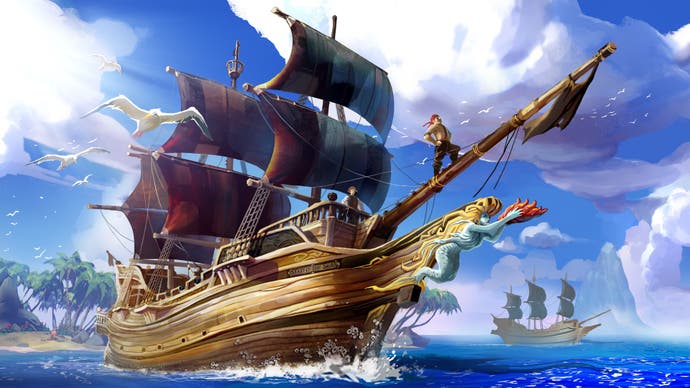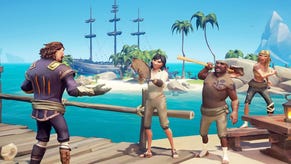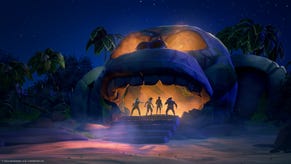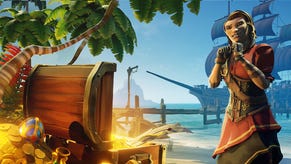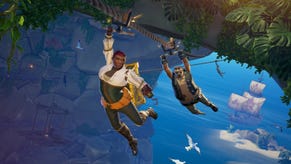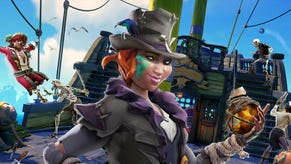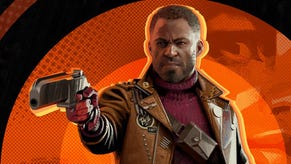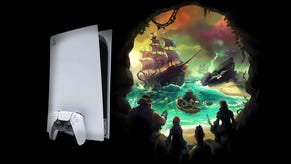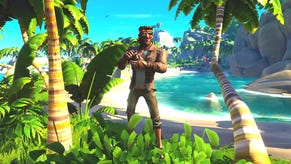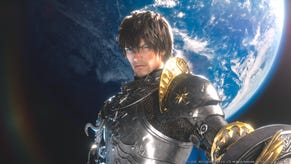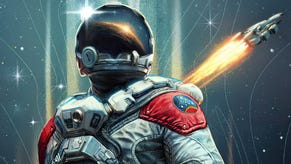The (extremely incomplete) history of Sea of Thieves, as told by Rare
On the pirate adventure's fifth anniversary.
Happy birthday, Sea of Thieves! It's been five years since Rare's delightful multiplayer pirate adventure first welcomed in treasure hunters, skull seekers, and bloodthirsty buccaneers - and almost the same again since the studio started work on the project back in the day.
In that time, there've been pre-launch beta highs and post-launch lows – particularly as the studio grappled with complaints about a lack of content in Sea of Thieves' earliest days of release – but some five years and 38 content updates later, it's proven to be one of the most beloved, enduring live service games around.
It's a journey that's seen Rare's initial ambitions shift and grow in step with Sea of Thieves' energised community - we've seen AI controlled skeleton ships take to the waves despite an initial player-only focus, the advent of authored narrative in a sandbox initially designed around player-created stories – and to celebrate the game's fifth birthday today, Eurogamer grabbed a grog and settled down with lead designer Shelley Preston, creative director Mike Chapman, executive producer Joe Neate, and Rare studio head Craig Duncan, charting some of the team's most memorable milestones and moments along the way.
POST-KINECT RARE AND THE GENESIS OF SEA OF THIEVES
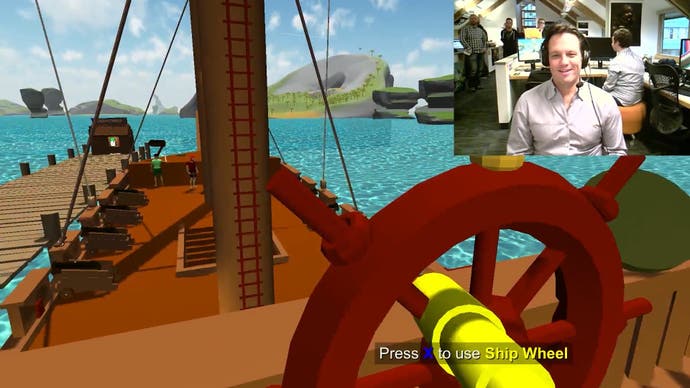
Craig Duncan: Kinect Sports, for whatever people said about it, was a 20-odd million selling franchise... it was hugely successful, but [after that] we definitely felt it was a reinvention point for Rare, the time and the opportunity to go and do something new.
It was very much about what is Rare for the next decade? What are we going to make? How are we going to work? What's the culture?... And we very quickly said we wanted to be about making new IP, that's really, really important for game companies to do. But it's also really hard... because you're trying to design for the future, [thinking] where's gaming going be four or five years from now? What do we think is important? What do we think the interesting trends are? What's something that no one's ever done before?... And then it was really about Joe and a small bunch of people [going away] with the brief of coming up with the next new IP from Rare.
Joe Neate: Yeah, and it turns out that's really hard! When you've got that completely blank slate, it's actually really challenging to go do... I think it can be easy to just go, well, I really want to do this, [but you have to ask yourself] what's it for? Who are you making it for? What's the real purpose behind it? And it was a few months at least of brainstorming that eventually landed us on that space of 'players creating stories together' which allowed so much more clarity of vision in all of the conversations through that prototyping phase, everything came back to that.
In our pitch we had video of DayZ, EVE Online, and it was these really interesting games coming from an independent space [that] were about creating those interesting stories... We were just like, this is the space we think's the most interesting for us to go and create something.
Shelley Preston: That very first headline we started on as a design team - players creating stories together - really captured our imagination... and was always a huge part of the core right from our very first prototype. The question [we always] asked was, how can we make this more social? So when it came to sailing the ship, is one person having a great time [but] doing everything? Can we split that up across players and encourage communication and encourage ways for players to work to be able to work together?... And I think that heart has never changed. We've just built around that heart to further strengthen that.
PLOTTING A COURSE THROUGH UNCHARTED WATERS
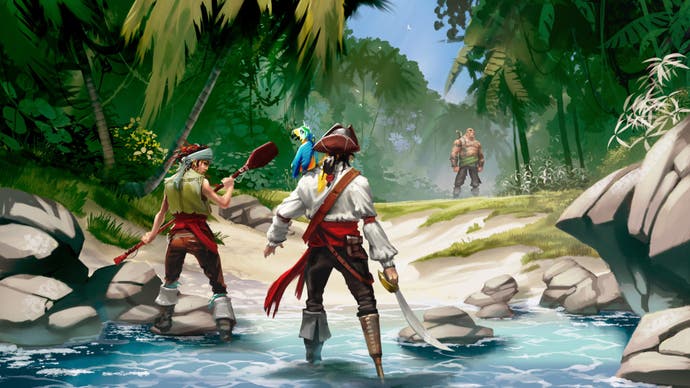
Craig Duncan: I think when there isn't a lot of things in a space, it's good, because that makes it a bit of a blank canvas, and we can go paint our own picture and do the things we think are right. But there were parallels. As Joe mentioned, there were PC early access titles we were looking at [early on] going 'Hey, there's something in what they're doing, there's something in the sandbox and looseness of their game. We like that'. So it's kind of like taking [these] little bits of other games and companies and saying, for instance, they did something really interesting with player communications, maybe we can learn from that.
Joe Neate: Like Double Fine back in the day, they were doing their Kickstarters, they were doing really fun behind-the-scenes videos... and I remember looking at their stuff and going, they're having fun, they're being open, and being transparent. That was an example of a great way to communicate, so it's like how we can be inspired in that specific space.... And so [head of creator engagement Jon McFarlane] was pretty much one of the first hires on the Sea of Thieves team, because I said to Craig, I don't quite know what we're going to do with this but I know we want to record the development of this [and] we're going to want to show behind the scenes and be more open with this.
BUILDING AN ENGAGED COMMUNITY YEARS BEFORE LAUNCH
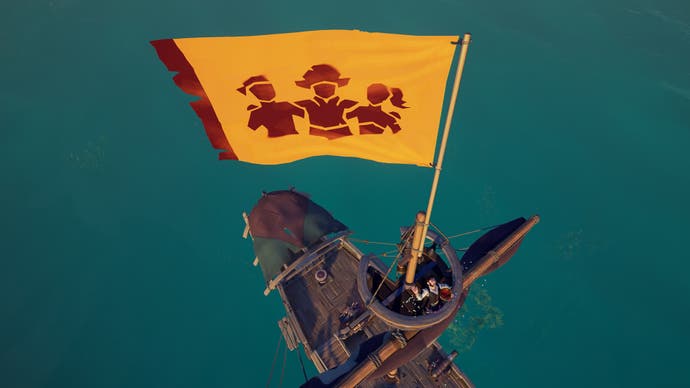
Joe Neate: Especially in the earliest days, we knew we were trying to create something that lived or died on what players did in it. And we were [creating] the 'tools not rules' approach, giving our players the tools and seeing what happened and then reacting to that, so it was like, how do we get it to them as early as possible?
And that led us to the technical alpha... but also, how do we build a community team that we can communicate with, how do we build a video team so we can share and talk? All of that thinking [came in] so early because [we felt it was so important to] build it with players.... And, you know, it took some convincing, both internally and within the organisation... but that transparency was there because it was about building this and growing it with people. It's just inherent in the game's design... We could have just gone and tried to [imagine] what players going to go do but you just wouldn't know what it's like to get it out in the real world.
Craig Duncan: I think [that transparency] was brave, it was different [for Rare at the time]. So when we stood in front of the organisation... it was very much, 'Hey, we're going to do something new, we're going to try this, and learn and then we're going to adapt'. And I think that conviction and confidence gets the support of those around you. And, you know, I feel good that we work in an organisation that actually encourages that, just having Rare do new things and being brave enough to do new things.... But obviously, that comes with its own pressure, which is the more liberated you are, then that strategy needs to pay off, and you need to show some success. The 'trust us we're going to try something new' is great, liberating, but also means you then have to go and fulfil that.
Joe Neate: [Even the E3 2016 gameplay trailer featuring community members], all these things just made sense to us, [like] the right way to do something like Sea of Thieves and show it off is to show people having fun... And you know, it wasn't without risk or challenge - trying to get people onboard a plan like that is challenging because it's risky. [But] we just took that all the way because we felt really strongly about it. It was the clarity of, this is how this game has to go to market for it to be a success and build that kind of player base... because we had zero right to have any community around Sea of Thieves just because we were Rare.
A LIVE SERVICE GAME BEFORE THE LIVE SERVICE BOOM
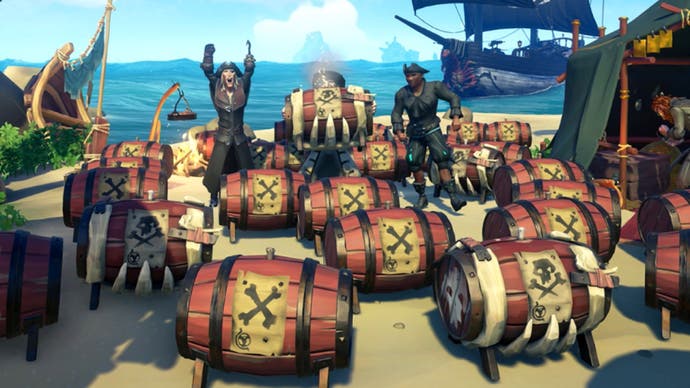
Craig Duncan: We always liked the idea of building it with the community, but the team in general liked the idea of an evolving game, and we didn't really know how back then. But we always talked about - and I think it probably drove the team a bit crazy, because we were building the game and shipping the game – how it'd be great if we could evolve it over time and tell stories, and the world would change.
Mike Chapman: Even around the time Sea of Thieves became a pirate game right back in 2014... we always knew it would expand over time. I don't think we ever used the term live service then, but the way I've always thought about it, and what's guided our decision making, is that Sea of Thieves is this pirate world, it's all about escapism.... We want it to feel intentful and meaningful like a living, breathing world where the Golden Age of Piracy is still to come and players are going to be part of that journey, because that can make it feel like the world exists off the screen. So when we say live service, I think now it's used as a business delivery strategy, but I've never thought about it that way. It's a creative approach that... just fits the type of world that Sea of Thieves is, it felt quite natural.
GAME PASS SERENDIPITY
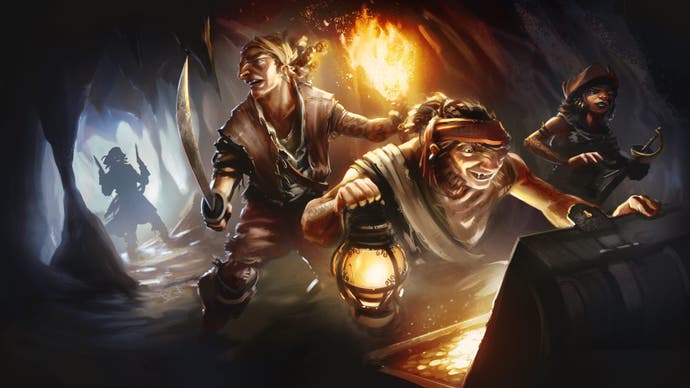
Craig Duncan: Obviously when we kicked off Sea of Thieves, Game Pass wasn't a thing, so it wasn't a designed-for new IP. [But] I remember Phil coming to Rare and saying, 'Hey, we've got this thing, Xbox Game Pass, we're thinking about putting new titles in', and we kind of had that conversation. And for us, [it was like] oh, that sounds new and brave and exciting... but then it was also like, what does this actually mean? Historically, you could kind of predict how many people were going to buy your game, whereas with a subscription service, how many people are actually going to turn up day one? What does that mean to your servers and services? And all of the things to think about when you've got a big scale multiplayer game.
Joe Neate: I think going in, there was definitely some questions, because we were the first first-party title to go day-and-date into Game Pass weren't we? And so there's the question of launch, but then I think post [that there's] the actual sort of the suitability of it as a service, because Sea of Thieves is a live game... it does fit pretty nicely with that as a service. We definitely didn't design it for Game Pass but it definitely [works].
Craig Duncan: Yeah, I remember when my son, who was 14 at the time, pitched me Game Pass. He came home and he went, me and my friends from football are playing Sea of Thieves, and it kind of threw me back. Because obviously, he had Sea of Thieves because I gave him a code, but they've just signed up for Game Pass and got Sea of Thieves too. It kind of solidified to me, yeah, we've just given anyone the ability to invite their friends to come [and play].... That was a real sort of 'aha' moment of [now you've] just got more people you can invite to play with, so I think that was the kind of number one design serendipity - when you've got a game about playing together, having more people you can invite is great.
Joe Neate: [But] if you're going to buy a game, you're doing quite a lot of research probably, from your friends, reading reviews, loads of different ways to go do that. Whereas on Game Pass, you can just be flicking through and go, 'Oh, I've heard about this, I'm gonna jump in and give it a try'. So now there's a completely different sort of scenario here. We have to start thinking about how do we educate those folks better? How do we get them to discover what's in the Sea of Thieves? And it's actually an interesting ongoing balance between us adding new things to Sea of Thieves but then also making sure it's discoverable enough for people who maybe join in after five years.
THAT ROCKY LAUNCH
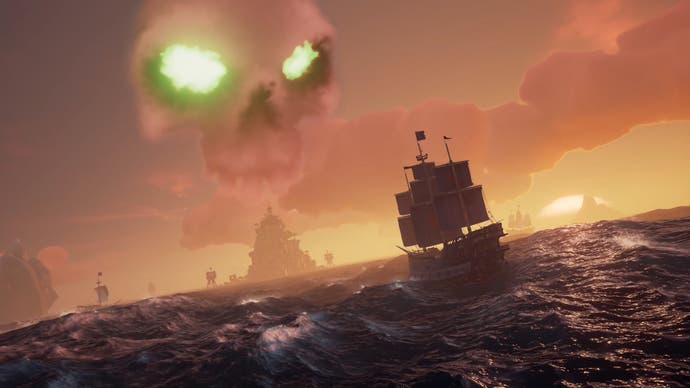
Mike Chapman: [We had that confidence] we were building something special [but] I think as we approached launch, and it became clear what that launch offering would be, there was always going to be this concern around, 'Are there going to be enough mechanics in the game to sell that core vision of what makes Sea of Thieves special?'. I remember thinking that quite acutely. I think it's unique to our game, which is that Sea of Thieves is not about a selection of mechanics done at any level of depth [but how these] mechanics combine in the shared world to creates those stories [and make] the magic we saw in that prototype.
I think the challenge was how do you get enough of those combinations to create those stories for launch - [and] even today, it doesn't feel like we're done, you can't have too much of that stuff, you can just keep going and going forever - so launch felt like this line in the sand where the real question was, have we done enough for people to understand the core experience?
Joe Neate: We'd educated and talked to the core people that really loved Sea of Thieves [and] really kind of got a big group of our community on board [to help] sell that message. We did lots of press, we did everything else. But whenever you bring people from outside that core who haven't come on that journey with you, I think in hindsight, it was always going to be a bit of 'whoa, okay' moment. What was the analogy someone used internally about launch? If you put your house party on Facebook and you've got all your friends that come in and then everyone else gets wind of it and turns up, there's always a bit of a clash of cultures and then your house is a bit of a mess. I think that is the kind of the challenge, that Sea of Thieves was different and I think at some stage we were going to have to rip the band-aid off and learn from a broader audience - how we talk about it, how we teach people how to play it, and everything.
Mike Chapman: And I have to be honest, being so close to something and then seeing it launch, and seeing the reception - which largely I'll summarize as, 'The foundational vision of Sea of Thieves is unique, it can lead to great experiences, but not enough people are having those great experiences' - the first couple of days, was I crushed? Absolutely, I was crushed. But then it was about, we've got a great foundation here, we've got a game we all love, we've got a passionate team. Now we've got a point to prove, that Sea of Thieves is a game that's going to have staying power. And thinking back to that first year, and the amount and the scope of the content that we released culminating in Anniversary, that was a team impassioned.
RIPPING UP THE ROADMAP
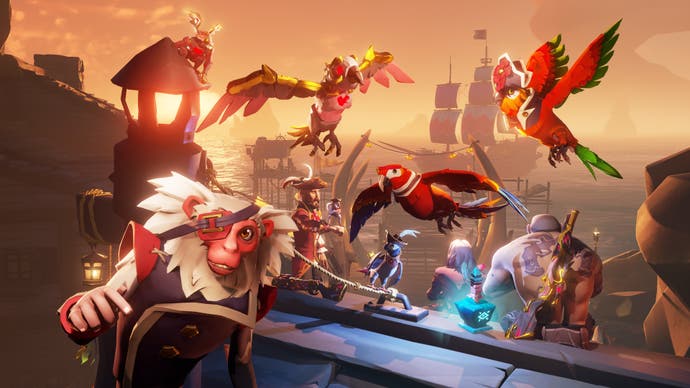
Craig Duncan: Even distilling the feedback [at launch was tough]. There were a bunch of people that were literally like 'Sea of Thieves is the best game ever, I get it, I love the freedom, I love the sandbox', and then there were people that were like, 'Oh, I don't understand what they're trying to do here. This is weird, directionless'. So that is just so polarising.... But [it's about] distilling that and then going, 'Okay, what do we think different types of people need? And what is the kind of content we think people are resonating with?' If people aren't getting it, [how do we] produce something that really helps them get it?'
Joe Neate: I think we spent a week in one of the meeting rooms here, just with loads and loads of posts, because we went and gathered all the feedback from everywhere... through the pain... And honestly, I think the way we internalised it was like, yes, there were people that loved Sea of Thieves, but there were a lot of people were going, 'Oh, this is cool. I love this bit, but there's not enough stuff for me to do or not enough direction'. And it was like, look, we've seen loads of interest, we've seen loads of excitement, the beta was really good, we saw loads of people come into this. And now you know, like, yes, we'll go fix the load issues and we'll make sure people can play it... but then [there were the people asking] are they going to add stuff to this? Are they going to do more? We'd been talking about this as being a service for years but [some people didn't] know that, they hadn't listened to any of that. And it's like, okay, we've always had a plan to update this, and now let's just go and prove that point out.
HOW MUCH OF YEAR ONE WAS PLANNED, HOW MUCH WAS NEW?
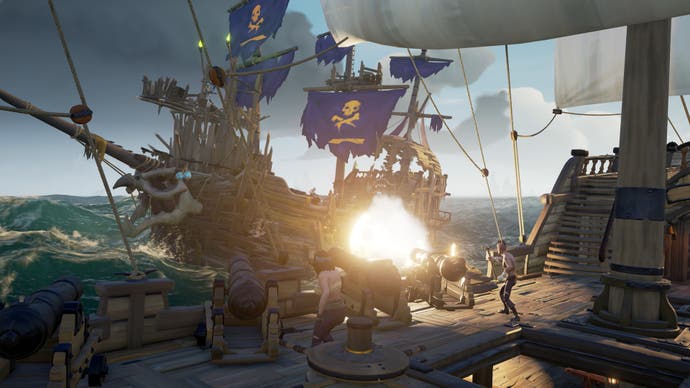
Joe Neate: It was a real mix because we had loads of stuff in the prototype that we knew we wanted to do, loads of different mechanics, but then there were other things which were like, 'Oh god, we've got a gap here that we just didn't have'... One of the examples of, like, ripping up that roadmap was the phrase, 'Every set of sails on the horizon is another player', we must have used that in so many interviews. And then in that first year, the feedback was that some people felt guilty almost because they wanted to have ship combat because it's great fun, but the only option we'd given them is other players, and it doesn't lead to a variety of stories... so that gives the vision and feedback to go and do something which we weren't planning to do - skeleton ships [in the Cursed Sails update], which make the world feel a bit more alive but also offers ship combat in a way that isn't actually ruining someone else's experience.
Shelley Preston: It was a bit of a blur of activity, because we launched and then we never stopped for a moment in terms of our momentum... It was like what's next for Sea of Thieves, and I think very quickly - I know we did have an idea of what was going to come which we changed - but very quickly we started formulating Hungering Deep, Cursed Sails, and the Forsaken Shores. Very quickly we already knew the next big beats for what Sea of Thieves was. And we were looking at those core aspects of what each of those updates would bring, and the gaps that they would kind of fill for the player experience. And then we were just on it like straight away, the momentum just didn't stop, and it still hasn't to this day.
Mike Chapman: Particularly in that first year, the focus was always on how do we get more players to appreciate that core.... The roadmap we originally had was very much [about], we're going to go push really interesting sandbox and systemic features. So we planned to do Captaincy, I think we would have done guilds in that first year, we were going to do player hideouts that were very much around more systemic progression-based features, rather than really easy to understand core content... which we doubled down on in that first year.
Craig Duncan: I think in credit to the team, we weren't afraid to change direction... The wrong thing to do would have been to hold our original plan, [but instead we were] like, 'Let's go rethink that plan, let's really go and do the right thing'. I think that was the harder route, but the right thing for the game, and our players.
ENTER THE MEGALODON!

Joe Neate: The Hungering Deep, the megalodon, that was a thing we didn't have planned in that prototype, but we wanted to go do something unique that brought people together in an interesting way [with a shared goal], and also introduced fun mechanics that were very Sea of Thieves in spirit, like the Speaking Trumpet. And I think everyone who was around in that first year remembers that update because it felt so much like this is Sea of Thieves foot forward, this is what this game is and how we're going to go do cool, interesting things from now on.
Shelley Preston: It was meant to be a really good showcase for the great social stories we believed in and knew could happen within Sea of Thieves [so] it was a way of us trying to mechanically surface that... and many players still say it's one of their favourite memories of the entire cycle because it was so special. We' always had this idea in our mind of the positive social impact Sea of Thieves can have and Hungering Deep was an expression of that.
Joe Neate: [That moment] was like gratification, I guess, that that vision and the thing we were really passionate about could play out... That if we put the right kind of mechanics and motivations in there, then you're going get to see really interesting stories. Because we all went out and played it, and I remember some kid swimming towards me with the Speaking Trumpet shouting in the water, 'We're friendly, we're friendly, do you want to come do this?'. I'm like, 'Yeah, let's go, this is cool, this is brilliant'... And for me, it was like validation [that] we can continue to be bold with what we're doing and try interesting things. Like, putting a Speaking Trumpet in was just mad! We just put something in for people to shout at each other across the seas! But it was just so funny. You don't get that anywhere else.
THE FOG BEGINS TO CLEAR WITH SHROUDED SPOILS
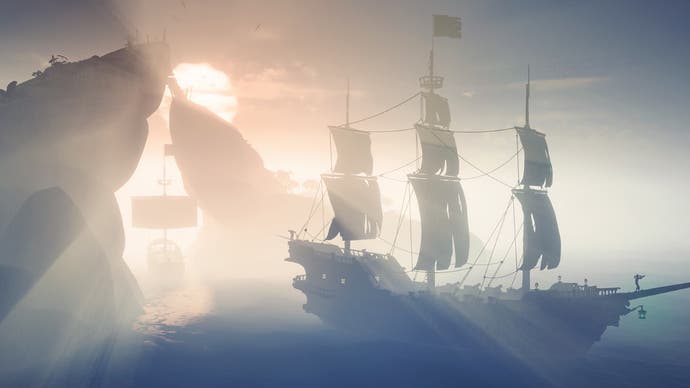
Joe Neate: When I look at milestones or moments, I think [of] Shrouded Spoils, which we released at the end of the first year and which really made that sandbox feel just alive, with [things like new Skeleton Forts, more megalodon, and] fog, and that created a real moment which blew up in a bit of a streaming kind of way. There was a bunch of excitement and buzz, and everyone was jumping in [and it felt like] changing the conversation. The conversation wasn't about content anymore, it was about, 'Wow, Sea of Thieves is in a really different space now and feels like the game a lot of people were asking for'.
Shelley Preston: For me, Shrouded Spoils was the moment it felt like other people understood the language we'd been speaking for so long, like [they] knew exactly what Sea of Thieves was and what it could be... where there were enough things interacting in enough unexpected ways that you could look at it and go, that's Sea of Thieves.... It felt like we'd known that for a really long time [as a team], but it was the first time players could really understand us on that level.
Joe Neate: Because that first year of development, it was hard. It was a challenge around launch because on the one hand, you were looking at player numbers and revenue goals for the year and going, 'Oh, look, we've hit them on day one at launch,' and then it's like, 'Oh, but here's the feedback and sentiment and the game's not working for everyone'. And as a team, kind of getting through that, and keeping momentum and keeping morale - because a lot of them are on social media and they hear that – the team worked so hard, and still the belief in that vision and the possibilities were there. So, I think seeing the Shrouded Spoils moment was an amazing one and then seeing Anniversary [shortly after], just really felt like okay, cool, we've kind of almost wrested control back of our destiny in a way.
CELEBRATING A YEAR ON THE SEAS IN A MAJOR WAY
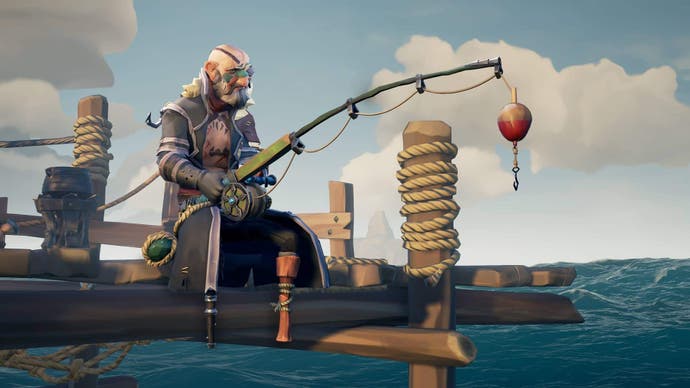
Mike Chapman: Anniversary was like a second launch moment. It felt like that on the team, that point to prove of not only are we going to add authored narrative into the sandbox with Tall Tales, we're going to add [fishing and a separate PvP Arena mode), we're going to build gameplay that we've never quite built before... and that just again put the fire in our bellies even more to round out that first year with a great release.
Joe Neate: I think we just wanted to try and create as big a moment as possible and give everybody a chance to kind of come back and go, there's something in this game for me now. Almost what I think was in a lot of people's heads when they saw Sea of Thieves, we wanted to give that kind of that opportunity. But there's the kind of the challenge of bringing in all those things at once, the more new stuff you're doing at the same time, the harder it is to deliver.
And that first year - the run up to launch and then straight into a year of development to [get to Anniversary] - was hard. And as leadership, you have to listen to your team and you have to listen to the impact it's had on them. And that's what we did after [Anniversary]. There were a lot of retrospectives around that, because it was it was rough. It was a hard year. And I think as a live service, there's always a conversation around sustainability and keeping that... balance of allowing people to have that time and everything else. It's a constant thing for us to discuss and try and find the right way to do it. And we don't always get it right. But Anniversary was one of our biggest lessons, in terms of bringing all that stuff in [at once].
THE BIRTH (AND LATER DEATH) OF SEA OF THIEVES' STANDALONE PvP MODE
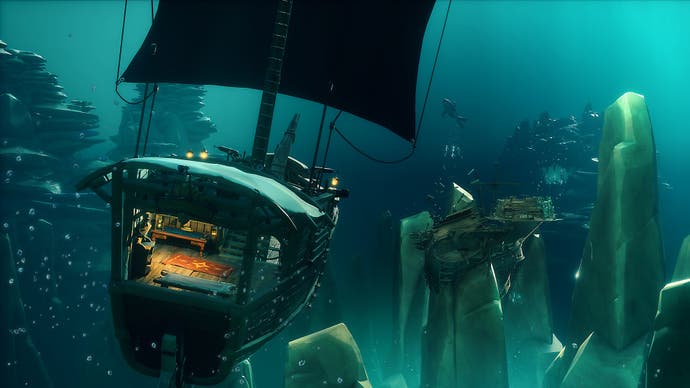
Shelley Preston: We'd always conceived of Arena, hadn't we? Sea of Blood, as we use to kind of refer to it. We loved the ship combat from day one, we knew we had something really special with it, and we always had this feeling that maybe there was something more specifically within that. I can't speak to the initial decision to separate it [from Adventure mode, and] it seems obvious when you look at Season Eight and the way PvP is now so intricately woven into the world, [that] that's the way we do it. But to get there, it does take all of those kinds of learnings, and I think your initial instinct is to go well that's a separate kind of thing to Adventure so it lives in this in this separate world [and] I'm really glad we tried it because we learned great lessons and we built a great team around it that continue to deliver.
Joe Neate: It's interesting as well, because I think whenever you go and do anything, you're always looking at, What's the thing we're trying to achieve? What's the experience? And, broadly, competition-on-demand was what we were going after with Arena. So you look at what your goal is, then you look at how can achieve it... And I think what we [eventually] did with Season Eight, it wouldn't have been possible back then. Because we didn't have that capability to swap servers in the way that we do now... But as your tools evolve, more and more things become possible. Obviously it was, it was a tough decision for us to take Arena out, but it's interesting looking back at it and what we achieved with that, because it was fun. It was great, I really enjoyed it.... And even now as we look to the future Sea of Thieves, we can go and take those lessons and bring those into different things in the future.
Shelley Preston: The seeds are always scattered [...] I can't think of anything that we've done, where it's kind of been like, that's it, where we just move on from that. There's always either a learning, or tech, or team capabilities. There's just always good growth from it every time.
FROM UNPREDICTABLE RELEASES TO A SEASONAL MODEL
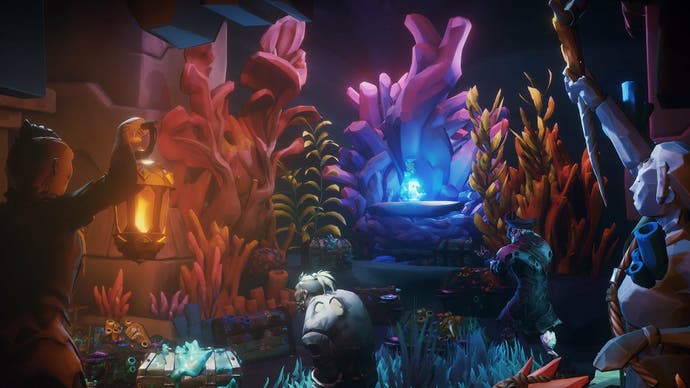
Joe Neate: [Seasons was] probably one of the first things where we really looked elsewhere and looked at other stuff in the live service world, but then [asked ourselves] what would be our version of this - it's always going to go through that translation layer for what for what Sea of Thieves is. And so one of the key tenets of that was that everybody should get this feeling of tangible reward and progression... but a lot of it is also predictability for players, that regularity of understanding of what the year ahead looks like. You know, there's more than one live service game out there, there's more than one form of entertainment that people have to fit their time around, and having a regular plan where you can look and understand roughly what you're going to get [is helpful to players].
And we're still learning. Honestly, we're learning every year, every time. You know, we've obviously had the Adventures approach for the last year or so and we've learned some good stuff on that. I won't talk specifically to what we're learning at the moment, because we're still going through a bit of a revision internally... but we've learned so much [from feedback] around things like decision points, around narrative in the shared world, around availability and length of time and checkpoints, there's loads of stuff that kind of folds into it. But there's that balance between what kicks off a season and refreshes the sandbox, and then how do we keep it exciting and interesting through that. But also the balance of adding new mechanics versus looking at the health of the game and going right, what are these things really annoying people or frustrating people that we need to go and address and fix?
A DISNEY HIGH THROUGH A COVID LOW
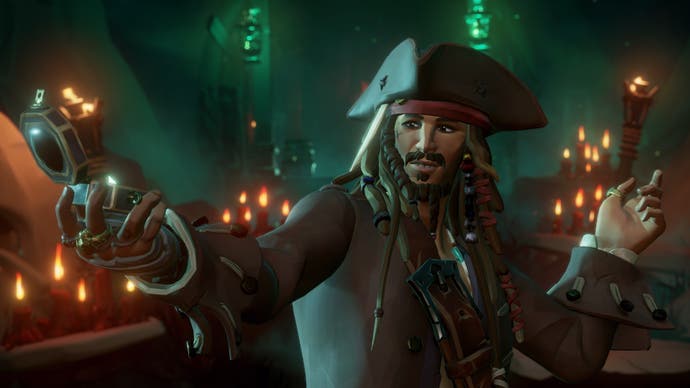
Craig Duncan: I remember that first meeting we had with Disney at E3. They're like, 'Sea of Thieves is the best pirate game and we have Pirates of the Caribbean as an IP. We could go and try and build the game you've already built or work with you. Can we figure something out?' Which was just to me an awesome milestone of how far Sea of Thieves had come.
Joe Neate: It's funny as well, because when you're at E3, everything's a bit crazy anyway, everyone's tired and jetlagged. And I think we just had the request, 'Disney wants to have a meeting with you'. And we're like, what about? So we go into a nice wood panel meeting room, and just listened to [what they were saying] and tried to stay cool.... It was really obvious they got Sea of Thieves, and it wasn't just lip service, and they were basically like,' 'The ball's in your court, we'd love to work with you but it's got to make sense for you and your game. Go away, have a think about it, and let us know what you think'. And I remember walking around the corner getting out the hotel, and... basically putting my arm around [Mike], and saying, 'We're going do this, we're going do something cool!'. It was one of those external validation moments [and it] was an amazing moment for the team, to come back to the studio and go, 'Guess what we're going to be doing?'.
Mike Chapman: That first meeting with Disney happened probably about six to seven months after the Anniversary update, so we'd already proven we could tell narratives and deepen our characters and explore our world. So speaking to Disney almost felt like the opportunity we'd created for ourselves.
Craig Duncan: I think we always knew we built something special, but to hear someone else say that, and for a company like Disney, obviously a renowned IP maker in their own right, to say, 'Hey, we've got an IP that we'd like you play with if you want to', that was awesome.
Shelley Preston: It still almost doesn't feel real we were able to do that in a dream kind of way, but especially the challenge that we had to deliver [what would become A Pirate's Life] through the COVID pandemic. I think A Pirate's Life was in its infancy - I don't even know if we'd been through as a team and outlined the five tales - but right at the very start of that we all came home.... And literally the whole thing was built from home during the pandemic... It was magic but surreal at the same time. And I'm phenomenally proud of the team, they knocked it out of the park, but from a personal point as well, hearing these stories about how games were bringing people together during the pandemic and the thought we were potentially contributing this positive thing for people who were going through this massive turmoil. You'd get up in the morning and it gave you drive and it gave you purpose and it gave you something to counteract some of the negatives of what was going on in the world.
Joe Neate: It's about as good a goal as you could have for us as a team to rally around during that time. It was such a clear thing of, like, we can go and do this amazing thing. It did distract you as well from what was going on, [from being stuck at] home and everything, and the craziness of the world. In some ways, it was the perfect project, despite those challenges, it allowed you to almost switch off at least during the day.
TIME FOR A REPEAT PERFORMANCE?
Joe Neate: I don't think we've ever rule anything in or out with Sea of Thieves' future. We loved [A Pirate's Life], our players have loved it. But it was a huge undertaking and a big challenge to go do that, and so there's always that balance of what's the right stuff to bring in at the right time? What teams do we have available? What the thing we're really excited about? But you know, we've got a great relationship with Disney as a partner, and in a lot of ways, we're just this ultimate kind of pirate world and universe that anyone could discover, right? The Sea of Thieves is out there, [and anyone] could find their way there.
AND NOW TO SEASON NINE, A NEW SHROUDED SPOILS MOMENT
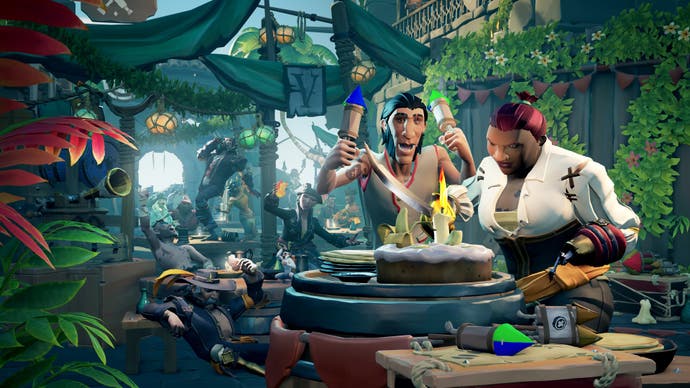
Shelley Preston: I think [current] Season Nine has been really exciting because it's an opportunity to look back and kind of refresh, reinvigorate, and revitalize the sandbox - in a Shrouded Spoils way in terms of its potential impact, in [that way of] tuning Sea of Thieves back to kind of speaking our language.
Mike Chapman: We'll always want to have these expansions where we're forging new ground and giving players completely new experiences in Sea of Thieves... it's just so exciting for the team to do. But alongside that, there're so many ingredients in the sandbox [that] it's become more and more apparent over the years that we actually need to have two approaches... We also need the time to go back and almost retool, tune up, rebalance, add little extra bits of value to the existing sandbox experience. So because for a lot of years we've always been forging forward and adding new mechanics and new experiences, sometimes we don't get to put that extra spit and polish on things, sometimes we don't get to explore the full value that these things could bring in the sandbox... So Season Nine, I'd say, it's a statement of intent. We want to have this healthy mix of big new seasons that move the experience forward, but then seasons that can revisit and refresh the sandbox.
REFLECTING AT THE FIVE-YEAR MARK
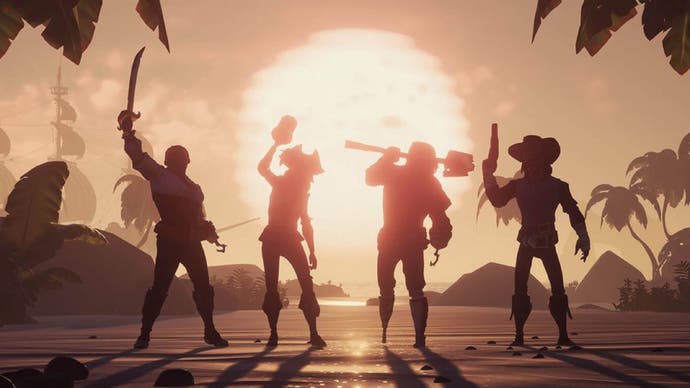
Joe Neate: You don't take a chance to reflect very often [and] I think actually it's been quite cathartic in a way.... I did a speech at the start of [the project when the team went to see The Goonies together] which was basically, this film is a bunch of friends going on a pirate adventure, and they're in search of treasure, but there're going to be challenges along the way. But it's all about camaraderie, having each other's backs. And this is how we should feel as a team, right? We're going on a challenging adventure, there's treasure at the end, but there're going to be moments of challenge on the way. But if we do this together, and support each other, we can succeed... And to be able to look back now at how far we've evolved and the stuff that we've done, I think it just kind of proves what, as a team and as a studio, you can do.
Mike Chapman: It's amazing... I think when you're working on the game, you lose that context and that perspective, because you're just so focused on what you're working on, trying to forge new paths ahead that players won't see for six months, a year, even multiple years. So I think out of all the anniversaries, probably since the first anniversary which was such a special one for us with the content that we released after that first year, I think the fifth anniversary feels particularly special. Because it does feel like that inflection point to almost look back... and you see how much we've done across those five years. You forget easily just being so laser-focused on what we're building.
Craig Duncan: I've just a huge sense of pride about the way the studio's evolved, about not only the togetherness we feel as a team, but also the togetherness with the wider community... We sort of see it every year, whenever we have an anniversary, we just get this outpouring from the community about what Sea of Thieves means to them, so there's a bit of me that's just looking forward to just indulging in that. Because I think... as a creator and a game maker, that stuff is hugely powerful.
THE ENDURING STRENGTH OF SEA OF THIEVES
Mike Chapman: I know it's a Walt Disney quote, but I'm a strong believer in the idea that when you believe in something, you believe in it implicitly, all the way. And I am very passionate about the fact we had a very strong vision back in 2014 we believed in, that we proved in a prototype. And even with the initial reception at launch, we never stopped believing in it. And everybody on this team loves this game like nothing else. And I think in an intangible way that you can't quite quantify, that passion has just poured itself into the game and shown up in so many little ways... And that's simply [down] to a team that had an idea we all believed in and we've just never give up on it.
AND WITH AN EYE ON NEW HORIZONS FOR VOYAGES YET TO COME
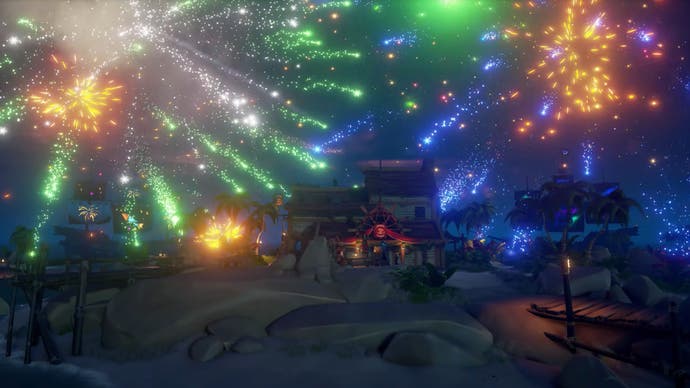
Joe Neate: We were in a planning session a couple of weeks ago... and we were just plotting out a future high-level roadmap for Sea of Thieves, plotting out five years ahead. And Craig made the joke, 'Oh, hold on, this is actually our 10-year roadmap, isn't it?'. And we said back in the day, we'll definitely get to 10 years, we've got to do this. And actually, we're looking at it now going, you know what, we might get to 10 years with Sea of Thieves! But I think that's the reality, that we've carved out a really unique space as a game, and to evolve that, to continue to grow, you need to learn, you need to try new things, but there's still so much passion and creativity for what we could do. Like literally the only challenge is deciding what and what order, and how do we go do the million crazy things we want to go do?
Craig Duncan: I think our intent and vision was always [that] we wanted this game to live for a long time, and I think that was probably more hope and ambition back then. [But] as we've reinvented the way Sea of Thieves evolves... I think we've just felt more confident than hopeful.
Mike Chapman: I don't think it'll ever be done, and I genuinely mean that. Joe often takes the Mickey out of me for saying that the story has just begun, but that's exactly how it feels. The theme is so broad - it's pirates, a fantastical world, it's full of this magic, lost artifacts, and adventures to go on - I just don't think you could ever run out of ideas. And when I look to the future and see the kind of community we've had the privilege to be able to create, and the success we're looking to have seen, I get really inspired by the fact this is the pirate game. This is the pirate game for modern audiences. And it does something different to every other game. It's a quintessentially Rare game, and I think it deserves to have a thriving life and it deserves to live forever, and it deserves to bring more people in. And that's what we're focused on doing.
Shelley Preston: I remember being at the first E3 with Joe, when we were doing some interviews and being like, we want to be here next year, and the year after that, and it felt really bold and ambitious to be saying it at the time. And now it's kind of like that's Sea of Thieves. We've got so much still to give; there are so many ideas, so many things we still want to go and achieve, a team that's still super excited - we still get up in the morning and we can't wait to go and deliver on Sea of Thieves.
